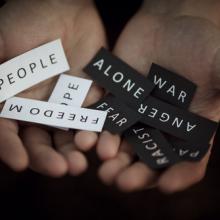love your enemies
Sid High is a trans Christian in Iowa and a youth ambassador for Beloved Arise. He spoke with Sojourners’ Mitchell Atencio.
I REALLY SUPPRESSED my trans identity before I came out. For me, that wasn’t accepting myself as my true self. There’s something to be said for being who you are without having to hide who you are for the approval of others. I feel more at peace with myself because God is pleased with me for being who I am and living in my authentic self. God wanted me to be who I am and to be able to show other people that they can be who they are too.
I started the first Pride event [in Marion, Iowa] when I was 15. That’s when I started getting interested in helping the community more. People often see the queer community as sinners. Even if people do believe it’s a sin, the right thing to do is not to judge and to continue to love — because that’s what Jesus did. God is Love, and [God] made us to love, regardless of who we love.
THE WORK OF peacemaking has been long beset by the stereotypes of it being “nice” work, polite to the point of being inoffensive. In her new book, Melissa Florer-Bixler wants to disabuse us of the idea that making peace means having no enemies. If anything, as she argues, Christians should have enemies well. Having enemies does not mean that the Christian who pursues justice incurs the resentment of others, but that their witness is direct, pointed, and takes sides.
The church, she writes, is “not to unify as a way to negate difference or to overcome political commitments,” but to sharpen those disagreements between the gospel and the world, particularly where reconciliation conceals power inequities. It does no one any favors, she suggests, to resolve moral disagreements within the church in a way that “disregards how coercion and force shape the lives of enemies.”
LOVING THY NEIGHBOR may be one of the greatest commandments, but loving thy enemies is surely the hardest. In the past few months, we’ve seen an outpouring of the former: crowds rallying at airports to welcome refugees; churches, cities, and campuses establishing sanctuary for undocumented immigrants; courageous bystanders intervening to protect strangers from harassment and violence.
But when it comes to loving the very people who have caused real harm to us and our neighbors—for example, peddlers of fake news, white nationalists, and members of certain presidential administrations—the crowd grows thin. And understandably so: Why should we extend love to those who perpetuate a politics of hate? What would loving those people even look like?
Former white nationalist Tony McAleer has an answer. As co-founder of Life After Hate, a nonprofit that helps people leave extremist groups, McAleer has seen how small gestures of compassion can transform those consumed by hate. So when McAleer met a young veteran inching toward anti-Islam extremism, he took him to meet a local imam. “It’s incredibly powerful to receive compassion from someone you’ve dehumanized,” McAleer tells Jason Byassee in our cover story.
Of course, loving your enemies does not mean condoning their actions. Neither does it mean a disregard for the safety or well-being of those who an enemy may harm, including ourselves. Yet even with these caveats, it’s impossible to domesticate Jesus’ commandment: Seeking restoration rather than retribution for those who do evil is truly radical. As Martin Luther King Jr. put it, nonviolent enemy-love forces us to recognize “that evildoers are also victims and are not evil people.” Try thinking about that the next time you see a sound bite of your least favorite politician.
Read Jason Byassee's profile of Tony McAleer, "Confessions of a Former White Supremacist," in the August 2017 issue.
“Love your enemies.” I’m reflecting on this, the hardest of Jesus’ commandments, as I grieve my own nation’s policies of war, exclusion, vengeance, and cruelty — policies envisioned through the lens of enmity. The lens of enmity warps our vision, inverting it so that the outside world is obscured by our inward fears. It contorts the human faces in front of us into monsters. It magnifies our own pain and obstructs that of others. It blinds us with lies.
I suppose it is an indication of how steeped in popular culture I am that the first thing that came to mind when I heard of the death of Westboro Baptist Church founder and former leader Fred Phelps was the song, "Freddie's Dead," by Curtis Mayfield. But although it is a relatively superficial and tangential connection to make, I still prefer that to much of the venom and grave dancing have witnessed since the announcement.
Phelps and his predominantly family-based ministry is best known for their over-the-top protests of everything from gay pride festivals to military funerals, as well as their deeply divisive and inflammatory signs. But given the fact that only a relative handful of people attend Westboro Baptist, and given the extreme nature of their mission and message, Phelps's ability to galvanize and garner the attention of the mainstream media was nothing short of remarkable.
It is less well known that Fred Phelps was kicked out of his own congregation in recent years as the beast of intolerance he had given birth to within his congregation turned even on him. Apparently, even Phelps himself had lost the necessary edge of judgment, anger, and intolerance his followers deemed necessary to champion their cause going forward.
God’s desire that we show others hospitality is a common theme in scripture; in the Old Testament showing hospitality was a cultural norm, much as it is today in shame and honor cultures. The New Testament frequently expresses its central importance as well. However, what does it actually mean to show hospitality? This is where things really get interesting: in English, we typically understand hospitality as a willingness to host, feed, and entertain a guest … something we all do and especially with our personal friends. However, what if the biblical term has a much deeper (and more difficult) meaning?
This is the problem we run into when we read the Bible in English and assume we understand what it’s saying … often, we don’t — or at least we don’t understand it fully. Trying to translate between languages is tricky like that, and the concept of “hospitality” is a prime example of what is missed between one language and another.
Based on our English definition, most everyone would consider themselves hospitable. But are we really?
Jesus says some stuff in the inaugural speech of his ministry that really upsets the status quo of both the religious and non-religious. In essence, he says, "If you are to follow me as King of this newly inaugurated Kingdom of God, you will need to start loving your enemies as much as yourself. You will need to start getting creative in how you deal with your oppressors in order to choose the way of love and reconciliation rather than the way of revenge and contempt. In fact, when you live as peacemakers, you best reflect what it looks like to be children of God. Those of you that choose this way of life will be blessed."
A few years later — after Jesus has been announcing the good news of the Kingdom through both word and deed — he looks over Jerusalem and begins to weep. Here is the people and the city that is to symbolize right relationship with God and humanity. It is to be a place of shalom where salvation flows through all aspects of life. It is to be the city of peace. Instead, Jesus stands on the Mount of Olives overlooking the city and laments, "If you, even you, had only recognized on this day the things that make for peace!"
Finally, Jesus, as king, messiah, and deliverer models this way of life to the point of death on a cross. Refusing to accept the lure of power through military might or pursuing peace through violence, Jesus embodies the life of suffering and self-sacrifice that he is calling his followers to emulate. Jesus, as the ultimate peacemaker, shows us that the life and work of peacemaking isn't some fairy tale euphoria, but the gritty, subversive and sacrificial life of faithfulness to a God and kingdom that lives by a different standard than the systems and powers of the world.
Last week was on in which what God envisions for our world seemed so very, very far away.
We watched in horror last Monday as two bombs exploded at the finish line of the Boston Marathon. We wept as we heard about the death of an 8-year-old boy, a 23-year-old grad student, a 29-year-old restaurant manager. We shuddered as we thought about the 170 people injured in the bombings, many of them losing feet or legs. We asked why. Why did this happen? How could human beings do this to others?
Tuesday, we learned about poisoned letters being sent to elected officials. Real poison, not just the poisonous words that are so much of our political dialogue. Is this really what God envisioned for us?







